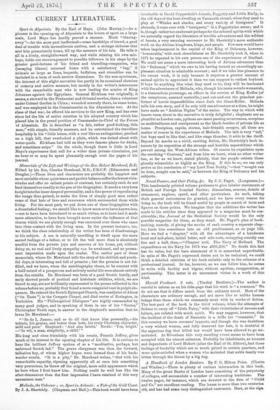Melinda, the Caboceer ; or, Sport in Ashanti : a
Tale of the Gold Coast. By J. A. Skertchly. (Chapman and Hall.)—This book would have been invaluable to David Copperfield's friends, Peggotty and Little Enaly,. in the old days of the boat-dwelling on Yarmouth strand, when they used to play at "Whales and sharks, and every variety of foreigners." It abounds, it runs over with "foreigners," in a Peggottyian sense ; and it is, though rather too exuberant perhaps for the sobered spirits with which we naturally regard the literature of terrible adventures and the wildest of beasts, a very amusing successor to Mr. Skertchly's more authentic work on the African kingdoms, kings, and people. Few men would have taken imprisonment in the capital of the King of Dahomey, however, honourable,' with such cheerfulness as Mr. Skertchly took it, when in 1871 he repeated in his own person one of the experiences of Sindbad. We could not name a more interesting book of African adventure than his " Dahomey," which we owe to his having turned an exceedingly un- pleasant situation to admirable account ; and if we take less pleasure in his recent work, it is only because it requires a greater amount of animal spirits to appreciate it than we can suppose to outlast boyhood. If boys be anything like what they used to be, they will be fascinated with the adventures of Melinda, who, though his name sounds womanish, is a tremendous personage, an officer in the service of King Koffee (of the sumptuous, annexed umbrella,) and out-and-out the grandest per- former of heroic impossibilities since Jack the Giant-Killer. Melinda tells his own story, and if he only told one adventure at a time, he might have made an "Arabian Nights " of the series. The way in which wild beasts roam about in the narrative is truly delightful ; elephants are as plentiful as London cats, pythons are mere passing occurrences, scorpions as multitudinous and omnipresent as the black-beetles of private life at home. Precipices, rapids, storms, hair-breadth escapes, all these are matter of course in the experience of Melinda. The talk is very "tall," but boys used to like that, and like stage thunder, it adds to the thrill. Beyond its merits as a vivid, exciting fiction, Mr. Skertchly's book in- terests by its exposition of the strange and horrible superstitions which prevail among the West-African tribes. Of course he expatiates upon the revolting "Customs," and from him we learn, what no other writer has, so far as we know, stated plainly, that the people esteem these ghastly solemnities as highly as the King. If this be so, we can only arrive at the conclusion of "my Lord Tom Noddy,"—that "nought can be done, nought can be said," as between the King of Dahomey and his subjects.






























 Previous page
Previous page